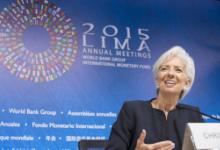
Typical street scene in Santa Ana, El Salvador. (Photo: iStock)
IMF Survey : Lagarde Calls for New Recipe for Stronger Growth
October 8, 2015
- Lagarde calls for policy upgrade to address weak growth
- Better policy mix, attention to spillovers, and global cooperation key
- IMF’s AIM is to help its members by being even more agile, integrated and member-focused
Policymakers in all countries will have to refine and upgrade their economic policies to boost growth and reduce global uncertainty, IMF Managing Director Christine Lagarde said.

IMF Chief Christine Lagarde at the opening news conference of the IMF-World Bank Annual Meetings in Lima, Peru (photo: Stephen Jaffe/IMF)
IMF-WORLD BANK ANNUAL MEETINGS
Addressing a news conference ahead of the 2015 IMF-World Bank Annual Meetings in Lima, Peru, Lagarde said that global policymakers will share experiences and discuss how to create a better policy mix for stronger, more durable, and inclusive growth.
Just as Peruvian cuisine has become a global success story by refining and updating traditional recipes, Lagarde said, global policymakers, too, needed to do the same.
“My key message to global policymakers: they need to upgrade their policy recipes to reinvigorate growth and reduce global uncertainty,” Lagarde said.
In this context, she presented the IMF’s Global Policy Agenda (see box), which outlines the challenges that policymakers face in a rapidly changing and uncertain global economy, the policy priorities for the IMF’s 188 members, and what the Fund can do to support its members. This agenda will be discussed during the Annual Meetings by the IMF’s policy-setting panel, the International Monetary and Financial Committee.
Growth prospects
The IMF released its world economic forecasts earlier this week, noting that global growth is expected to be weaker this year than last, at 3.1 percent, with only a modest acceleration to 3.6 percent in 2016.
“Such growth prospects are not enough to significantly reduce global unemployment and further reduce poverty levels,” Lagarde told news reporters.
In a speech last week in Washington DC, Lagarde noted that the outlook was affected by major economic transitions, including the prospect of rising U.S. interest rates, China’s slowdown, and the rapid drop in commodity prices. She stressed, however, that with the right policies, strong leadership, and global cooperation, it can be managed.
But I would not paint a dark picture, she said in response to a question. “I would simply insist on the policy mix that can be applied in order to move from an uneven and modest recovery, which has decelerated to something that is definitely stronger.”
Better recipe for growth
Lagarde highlighted three key ingredients for better growth.
First, manage the economic transitions. This involves a policy recipe that includes demand support, financial stability measures, structural reforms—and specific policy upgrades.
Second, watch for spillover effects. Central banks in advanced economies should give due consideration to the risks of spillovers from their policy decisions; and emerging economies should firmly address the buildup of corporate leverage and foreign debt.
And third, international cooperation. Given the global nature of the challenges we face, such cooperation is “indispensable,” Lagarde noted. From economic spillovers, to refugee crises, to international development, to climate change, “no country can go it alone,” she said.
The IMF’s AIM
As the IMF’s 188 member countries are facing increasing challenges, it is incumbent on the Fund to help them, Lagarde said. The IMF’s “AIM”, she said, is to be even more Agile, Integrated and Member-focused to support its members in the transition to a new era of durable, inclusive growth.
Lagarde addressed a broad range of topics in her opening news conference, tackling questions ranging from China’s growth slowdown as it rebalances its economy, the situation in the Middle East and Africa, to the Fund’s relations with Latin America (watch webcast of press conference).
Responding to new realities
The IMF’s membership is facing a rapidly changing and uncertain world. Policymakers are increasingly grappling with difficult trade-offs. The Managing Director’s Global Policy Agenda calls for mutually reinforcing policies needed to support growth today, to invest in resilience and to secure a sustainable and inclusive future.
The Global Policy Agenda, which will be discussed with the IMF’s policy-setting body—The International Monetary and Financial Committee—outlines the challenges that policymakers face, the policy priorities for the IMF’s 188 members, and what the Fund can do to support members.
The report also underscores an enhanced AIM for the institution: Agility, Integration and Member-focused. Under this umbrella, policy advice will help members respond to tighter and more volatile financial conditions and implement effective macro-structural reforms. In the face of increasing policy trade-offs, the Fund will better integrate policy advice across sectors and regions and better leverage synergies between surveillance and capacity advice. The IMF will also deepen its engagement with members, bolster knowledge management and ensure faster feedback to policymakers.
Read the Global Policy Agenda


